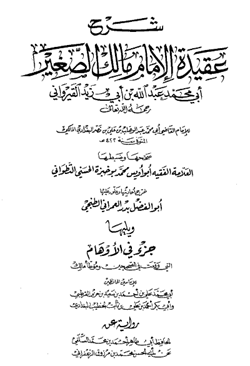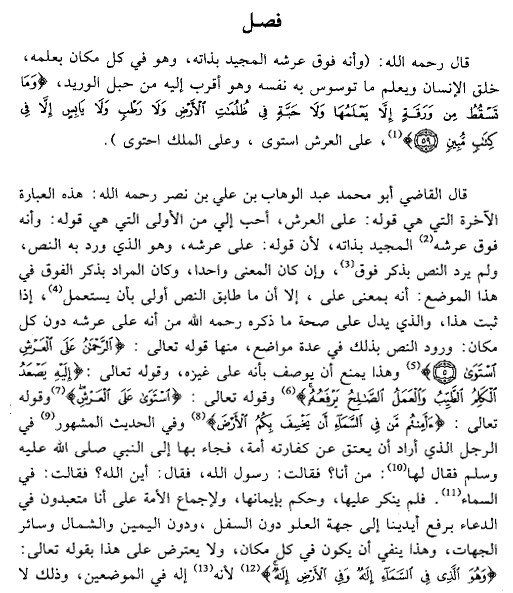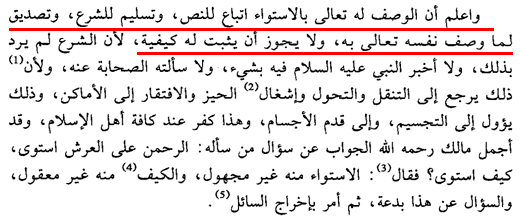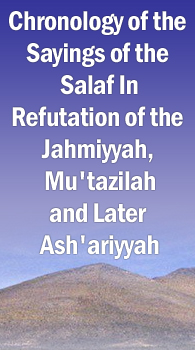| Tuesday, 23 April 2024 Home • About Us • Contact Us |
 | |
|
|
|
Mail to a Friend • Printer friendly 
So in this article we are going to quote from another Maalikee scholar who was contemporary to Ibn Abi Zayd al-Qayrawaanee and who wrote an explanation of the muqaddimah of Ibn Abi Zayd (printed version cover is pictured above) and he is: the Imaam, and Shaykh of the Maalikiyyah Abu Muhammad Abd al-Wahhaab in Alee ibn Nasr bin Ahmad bin Husayn bin Harun bni Amir al-Arab Malik bin Tuq al-Taghlabi al-Iraqee (d. 422H) the Maliki jurist, and al-Dhahabi mentions in al-Siyar (17/429) that "he has a book of acquaintance in explanation of the risaalah". In his book "al-Asnaa Fee Sharh Asmaa Allaah il-Husnaa", Abu Abdullaah Muhammad bin Ahmad al-Qurtubi (and he is the mufassir, author of al-Jaami' Li Ahkaam il-Qur'aan) says, when discussing the numerous opinions held on the issue of Allaah's istiwaa (ascending) over the Throne (Volume 2, page 123), he mentions al-Qaadee Abd al-Wahhaab al-Maalikee:
 And the sixth: The saying of at-Tabaree, Ibn Abee Zayd, al-Qaadee Abdul-Wahhaab and a group (jamaa'ah) of shuyook (scholars) of hadeeth and fiqh (jurisprudence) and it is apparent (from) some of the books of the qaadee, Abu Bakr [al-Baqillani] - may Allaah be pleased with Him, and [also] Abul-Hasan [al-Ash'ari]. And al-Qaadee Abd ul-Wahhaab quoted this from him, I mean from al-Qaadee Abu Bakr, textually - which is that He, the Sublime, ascends over His Throne with His Essence (bi dhaatihi) - and in some places they applied (the words) "above His Throne (fawqa arshihi)". And the sixth: The saying of at-Tabaree, Ibn Abee Zayd, al-Qaadee Abdul-Wahhaab and a group (jamaa'ah) of shuyook (scholars) of hadeeth and fiqh (jurisprudence) and it is apparent (from) some of the books of the qaadee, Abu Bakr [al-Baqillani] - may Allaah be pleased with Him, and [also] Abul-Hasan [al-Ash'ari]. And al-Qaadee Abd ul-Wahhaab quoted this from him, I mean from al-Qaadee Abu Bakr, textually - which is that He, the Sublime, ascends over His Throne with His Essence (bi dhaatihi) - and in some places they applied (the words) "above His Throne (fawqa arshihi)". The Imaam, Abu Bakr (Muhammad bin al-Hasan al-Hadramee al-Qayrawaanee) said: "And that which I say is [what is] correct [i.e. Allaah being above the Throne, making istiwaa with His Essence], without confinement, nor fixing in a place, nor being inside of it, and without touching". I [al-Qurtubi] say: This is the saying of al-Qaadee Abu Bakr in the book of his "Tamheed ul-Awaa'il". And we have mentioned it. And this has also been said by the teacher, Abu Bakr bin Fawrak in "Sharh Awaa'il il-Adillah", and it is the saying of Ibn Abdul-Barr, and at-Talamankee and others from amongst the Andulusians, and [also] al-Khattaabi in the book "Shi'aar ud-Deen", and that has already preceded. It is this Qaadee Abd al-Wahhaab and his sharh (explanation) of the risaalah (muqaddimah) of Ibn Abi Zayd that we are going to quote from here. One should also note that like al-Baqillani (d. 403H) (also a Maliki) and other early Ash'arites, Qaadee Abd al-Wahhaab was affected by the Kullaabiyyah and had something of kalaam with him, as was the case with others from the Hanbalis like al-Qadi Abu Ya'laa (d. 458H) from that same era. All of these Scholars who were influenced by the school of Ibn Kullaab are different from the later Ash'arites who tended to the views of the Jahmiyyah and Mu'tazilah in the topic of al-Uluww and the Sifat Khabariyyah. Thus, we will see kalaam influenced language in the writings of these Scholars and a particular angle when it comes to the main hall-mark of the Kullaabi school, which is negation of Allaah's chosen actions (sifaat fi'liyyah, af'aal ikhtiyaariyyah), a matter inherited from the Jahmiyyah and Mu'tazilah to which Ibn Kullaab, the founder of this doctrinal school, was unable to refute for the lack of his grounding in the Sunnah and aathaar, even though he refuted them vehemently on the matter of al-Uluww and the Sifat Khabariyyah Dhaatiyyah (like face, hands, eyes).
Al-Qaadee Abd al-Wahhaab al-Maalikee Explains Ibn Abi Zayd al-Qayrawanee's Statements on the Uluww of Allaah the Exalted - A Lightning Strike Against the Jahmiyyah Claiming Association with Ibn Kullaab and Abu al-Hasan al-Ash'ari This passage is from the 1st edition print (Dar Kutub al-Ilmiyyah, Beirut, 1423H, pp.25-26):
 He [Ibn Abi Zayd] (rahimahullaah) said: He [Ibn Abi Zayd] (rahimahullaah) said:
And that He is above His Glorious Throne with His essence, and is in every place with His knowledge. He created man and He knows what his soul whispers to him, and He is closer to him (in knowledge) than his jugular vein, "And no leaf falls except that He knows it, and there is no seed in the darknesses of the earth, and nor anything fresh or dry except that it is in a manifest book." (6:59). Upon (alaa) the Throne did He make istiwaa and the dominion (of His creation) has He encompassed. Al-Qaadee Abu Muhaammad Abd al-Wahhaab bin Alee bin Nasr (rahimahullaah) said: This last expression which is his saying, "Upon (alaa) the Throne" is more beloved to me than the first one (he said earlier) which is his saying, "And that He is above (fawq) His Glorious Throne with His essence..." even though the meaning is one and the same, and the intent behind mentioning "above" (fawq) in in this place is that it is with the meaning of "upon" (alaa), except that that which agrees with the (revealed) text (in this instance) is more befitting to be used (i.e. 'alaa instead of fawq). Once, this has been established, then that which indicates the correctness of what he (rahimahullaah) has mentioned in that He is upon His Throne as opposed to (being in) every place is that the text has related this in numerous places, from them is His saying, "The Most Merciful made istiwaa over the Throne" (20:5), and this prevents from that He is described as upon (alaa) other than it (the Throne). And His saying, the Exalted, "To Him ascends the goodly word, and the righteous action raises it (the goodly word)..." (35:10), and His saying, the Exalted, "He made istiwaa over the Throne" (7:54) and His saying, the Exalted, "Do you feel secure that He who is above the heaven will not cause the earth to sink with you..." (67:16). And in the famous hadeeth about the man who wanted to free a slave-girl as expiation, he came with her to the Prophet (sallallaahu alayhi wasallam) and he said to her, "Who am I?" She said, "The Messenger of Allaah." Then he said, "Where is Allaah?" She said, "Above the heaven" and he did not show rejection to her, and judged faith for her. And the consensus of the Ummah is that we worship with supplication by raising our hands in the direction of above (uluww) as opposed to below, and as opposed to the right and the left and all the other directions, and this negates that He is in every place, and this does not clash with His, the Exalted's saying, "He is in the heaven an ilaah (a deity) and upon the earth a deity" (43:84) because he is a diety (worshipped) in both places (in the heaven and earth) and this does not mean that He is in every place in which He is worshipped... Notes
First: This contains an unveiling and exposition of intellectual fraudsters from today's Jahmiyyah. People like GF Haddaad, Faqir and others who are operative on the web pushing the deen of the Jahmites upon the common-folk, have long been using deception, lies and fraud in trying deceive people that just because a number of scholars (like al-Dhahabi) have disliked the use of the word "bi dhaatihi" the uluww of Allaah, with His essence, is somehow negated and disproven(!) in their feeble attempts to pull the wool over the eyes of the common Muslims. Pretending not to realise that these scholars (and al-Qaadee Abd al-Wahhaab, from the most prominent of the Maalikees of the fifth century hijrah is one of them), affirmed the meaning that Allaah is indeed over His Throne, with His essence, but they simply preferred to stick to the Qur'anic text, since the use of the word "bi dhaatihi" or "fawq" (in relation to the verse of al-Istiwaa in particular) is redundant in their view, because the actual intent is to say Allaah (himself) is "alaa" (upon, over) the Throne. Al-Qaadee Abd al-Wahhaab al-Maalikee on Not Delving Into the Kaifiyyah of al-Istiwaa Al-Qaadee Abd al-Wahhaab said a little later (p. 28):
 Know that the description for Allaah with al-Istiwaa is (out of) following the text, submission to the Shariah, and believing in what Allaah described Himself with. It is not permissible for kaifiyyah to be established for it, because the Shariah has not related that, and nor did the Prophet (alayhis salaam) inform of anything about it, and nor did the Companions ask about it. And because that (kaifiyyah) returns back to transportation (tanaqqul), change (tahawwul), occupation (ishghaal) of a void (hayyiz) and need for places (amaakin), and this then leads to tajseem and to the eternity of bodies, and this is disbelief to all the people of Islaam. And Imaam Maalik (rahimahullaah) gave a beautiful response to the question of the one who asked him, "The Most Merciful made istiwaa over the Throne, how did He ascend?", so he said, "Al-Istiwaa from Him is not unknown, the kayf (how) is not fathomable, asking about it is an innovation," then he ordered the man to be expelled. Know that the description for Allaah with al-Istiwaa is (out of) following the text, submission to the Shariah, and believing in what Allaah described Himself with. It is not permissible for kaifiyyah to be established for it, because the Shariah has not related that, and nor did the Prophet (alayhis salaam) inform of anything about it, and nor did the Companions ask about it. And because that (kaifiyyah) returns back to transportation (tanaqqul), change (tahawwul), occupation (ishghaal) of a void (hayyiz) and need for places (amaakin), and this then leads to tajseem and to the eternity of bodies, and this is disbelief to all the people of Islaam. And Imaam Maalik (rahimahullaah) gave a beautiful response to the question of the one who asked him, "The Most Merciful made istiwaa over the Throne, how did He ascend?", so he said, "Al-Istiwaa from Him is not unknown, the kayf (how) is not fathomable, asking about it is an innovation," then he ordered the man to be expelled.There are a number of points here: First: Refutation of those who claim this is not a sifah (attribute) of Allaah, the Exalted, since al-Qaadee Abd al-Wahhaab said, "Know that the description for Allaah with al-Istiwaa is (out of) following the text, submission to the Shariah, and believing in what Allaah described Himself with..." hence, this is a description He gave to Himself. Second: In this commentary al-Qaadee Abd al-Wahhaab has spoken with the position of Ahl al-Sunnah in negating knowledge of the kaifiyyah since no text has come concerning it, this knowledge was not given to us. This is because affirming and describing a kaifiyyah could only be in terms of what we see taking place in this world and this would mean giving a kaifiyyah that would be like that found in the creation. Here, al-Qaadee Abd al-Wahhaab employed the language of Ahl al-Kalaam (al-ajsaam wal-a'raad) which is not from the way of the Salaf, as this speech is alien to them and they condemned any speech involving this in matters pertaining to Allaah's attributes. But as we said, many of the followers of the madhaahib and scholars of hadeeth in the fifth century came under the influencce of some of this kalaam and it found its way into their writings. In any case, the kaifiyyah is not entered into and the best way is affirmation of the text, leaving it upon its dhaahir, and relegating its kaifiyyah to Allaah, the Exalted, as explained by al-Khateeb al-Baghdaadee (see here):
فمذهب السلف رضوان الله عليهم إثباتها وإجراؤها على ظواهرها ، ونفي الكيفية والتشبيه عنها
 ... the madhhab of the Salaf - may Allaah be pleased with them all - is to affirm them, and to carry them upon their apparent meanings (alaa dhawaahirihaa) and to deny [knowledge of] their kaifiyyah (their true reality) and to negate tashbeeh (resemblance) for them. ... the madhhab of the Salaf - may Allaah be pleased with them all - is to affirm them, and to carry them upon their apparent meanings (alaa dhawaahirihaa) and to deny [knowledge of] their kaifiyyah (their true reality) and to negate tashbeeh (resemblance) for them.Note that al-Qaadee Abd al-Wahhaab does not make tafweed of the meaning, but of the kaifiyyah, that is what is denied. Ibn Taymiyyah states something similar in relation to al-Nuzool in his book, Sharh Hadeeth al-Nuzool (p. 459) - (see this article for arabic quote):
 And that which it is obligatory [to speak with] definitively: Is that Allaah, there is nothing that is a likeness to Him in everything that He has described Himself with. Thus, anyone who describes Him with the likeness of the attributes of the creation in anything from amongst the things, then he is errant, definitively, absolutely. Such as the one who says, "He descends, undergoing motion and movement (yataharrak, yantaqil) just like a person descends from the roof to the lowest part of the house" and like the saying of the one who says, "His Throne becomes unoccupied of Him, and so His descent is vacating one space and occupying another", and this is baatil (false), it is obligatory to free the Lord from this, as has preceded. And that which it is obligatory [to speak with] definitively: Is that Allaah, there is nothing that is a likeness to Him in everything that He has described Himself with. Thus, anyone who describes Him with the likeness of the attributes of the creation in anything from amongst the things, then he is errant, definitively, absolutely. Such as the one who says, "He descends, undergoing motion and movement (yataharrak, yantaqil) just like a person descends from the roof to the lowest part of the house" and like the saying of the one who says, "His Throne becomes unoccupied of Him, and so His descent is vacating one space and occupying another", and this is baatil (false), it is obligatory to free the Lord from this, as has preceded.Thus, giving a kaifiyyah for the meanings of the Attributes found in the Book and the Sunnah is not from the way of Ahl al-Sunnah, and if you are confused about separating the meaning from the kaifiyyah and affirming the first but denying the second, there is an explanation of this matter from the foundations laid down by al-Khateeb al-Baghdaadee regarding the attributes - see this article. And it is no different to the Ash'arites affirming the meanings of life, hearing, seeing, yet at the same time able to deny that these meanings (ma'aanee) for Allaah are like the realities (haqaa'iq) and forms (kaifiyyaat) for these meanings found in the creation, and the Salaf never distinguished between any of what Allaah is described with in this regard (names, attributes and actions). Ibn Abi Zayd al-Qayrawaanee's and al-Qaadee Abd al-Wahhaab al-Maalikee's Refutation of the Jahmiyyah and Mu'tazilah Claiming Istiwaa is Isteelaa On the same page (p. 28) al-Qaadee Abd al-Wahhaab comments upon the saying of Ibn Abi Zayd, "...and the dominion (of His creation) has He encompassed
 And his saying, "...and the dominion (of His creation) has He encompassed..." returns back to the meaning of qudrah (power) and quwwah (strength) and that there is no King except He, and no one powerful over every thing except He, and similar to this is the saying of the Muslims, "The dominion (mulk) belongs to Allaah", absolutely, they intend the negation of dominion for anyone besides Him, this is (from) the understanding of the language (linguistic perspective), and it is not from the evidence of discourse at all, and this is because the linguist when he wants to inform of something that is specified with a meaning [as opposed to others], he enters the definite article which is for defining an entire species, and then he annexes it that which it is annexed and thus as a result, through what is understood by the discourse, he negates anyone else sharing with him in that thing... And his saying, "...and the dominion (of His creation) has He encompassed..." returns back to the meaning of qudrah (power) and quwwah (strength) and that there is no King except He, and no one powerful over every thing except He, and similar to this is the saying of the Muslims, "The dominion (mulk) belongs to Allaah", absolutely, they intend the negation of dominion for anyone besides Him, this is (from) the understanding of the language (linguistic perspective), and it is not from the evidence of discourse at all, and this is because the linguist when he wants to inform of something that is specified with a meaning [as opposed to others], he enters the definite article which is for defining an entire species, and then he annexes it that which it is annexed and thus as a result, through what is understood by the discourse, he negates anyone else sharing with him in that thing...Many of the Scholars of Ahl al-Sunnah, from them Ibn Abi Zayd, made a point that when they affirmed al-Istiwaa, they made a separate additional statement to the effect that "He also owns the entire dominion (mulk)" specifically to rebut the falsehood of the Jahmiyyah and Mu'tazilah who were trying to claim that al-Istiwaa is al-isteelaa (conquering the throne, which they said was a metaphor for the dominion). This indicates also that those pretending to be followers of Abu al-Hasan al-Ash'ari in our times are but followers of the Jahmiyyah and Mu'tazilah in opposition to and in enmity to Ahl al-Sunnah and even some of the factions of Ahl al-Kalaam, such as Ibn Kullaab and the early Kulllaabi Ash'aris, or those who came under that influence in their language and speech in the matters of the attributes of Allaah. Notes and Conclusions
Alhamdulillaah, through this citation we have further corroboration that the belief of the Muslims is that Allaah himself, with His essence, is above the Throne, there is nothing wrong with this statement, it expresses the belief of the Muslims, except that some Scholars, while acknowledging its meaning is the absolute truth, preferred sticking to the wording of the verse or hadeeth in whatever it relates to. Further Important Reading to Augment This Article: The following articles constitute important reading if you want to grasp historical realities and see through the smoke and mirrors of todays Jahmites posing as followers of Ibn Kullab and al-Ash'ari.
Link to this article: Show: HTML Link • Full Link • Short Link Related Articles: Add a Comment (comments are currently moderated) You must be registered and logged in to comment. |
|
|
ý AboveTheThrone.Com. All rights reserved.
|
 The Imaam of the Maalikees of his time, Abd Allaah Abu Muhammad bin Abi Zayd al-Qayrawaanee (d. 386H), he was the Shaykh of the Maalikees in al-Maghreb, he was granted vast knowledge, of great memorization, and learned in the narrations and their undertanding, and he was a follower of the way of the Salaf, calling to it with the pen, word and deed. He has a famous tract on creed called the Muqaddimah, which is a short treatise on creed. He as amongst the first to write down the use of the word "bi dhaatihi" in relation to Allaah's uluww, meaning that Allaah is Himself, with His essence, above His Throne, above His creation. This creed found in his book, which is the creed of the Salaf regarding Allaah's uluww, grieved the enemies of Allaah, the Jahmites, and they have never ceased to this day, trying to explain away this particular statement of al-Qayrawaanee in a manner that negates the uluww of Allaah, the Exalted.
The Imaam of the Maalikees of his time, Abd Allaah Abu Muhammad bin Abi Zayd al-Qayrawaanee (d. 386H), he was the Shaykh of the Maalikees in al-Maghreb, he was granted vast knowledge, of great memorization, and learned in the narrations and their undertanding, and he was a follower of the way of the Salaf, calling to it with the pen, word and deed. He has a famous tract on creed called the Muqaddimah, which is a short treatise on creed. He as amongst the first to write down the use of the word "bi dhaatihi" in relation to Allaah's uluww, meaning that Allaah is Himself, with His essence, above His Throne, above His creation. This creed found in his book, which is the creed of the Salaf regarding Allaah's uluww, grieved the enemies of Allaah, the Jahmites, and they have never ceased to this day, trying to explain away this particular statement of al-Qayrawaanee in a manner that negates the uluww of Allaah, the Exalted. 




